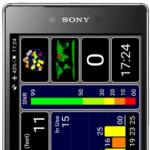Case of the short form of the adjective. Full and short forms of adjectives
The category of completeness / brevity is realized only in the category of qualitative adjectives and is formed by contrasting two forms - full and short - of the same adjective: white - white; old is old.
The short form is formed by adding a positive degree of endings to the base: Ø for male, -and I for women - o/-e for the average, - s / -i for plural ( deep-Ø , deep-a, deep-o, deep-and).
If at the end of the stem there is a combination of consonants with<н>or<к>, then during the formation of the form m.r. a "runaway" vowel appears ( thin - thin, full - full). For adjectives with bases in -enn (such as painful, artificial, frivolous, numerous) in the form of m.r. truncation occurs -n (painful (cf. painful), artificial).
A short form is not formed from quality adjectives that
1) have suffixes characteristic of relative adjectives - sk-, -ov- / -ev-, -n-: brown, coffee, fraternal;
2) denote the colors of animals: brown, black;
3) have suffixes of subjective assessment: tall, blue.
From adjective small the short form is formed with the truncation of the stem-forming suffix – enk - (small - small, few, small), but from the adjective big- suppletive (big - great, great, great, great).
Short form only have adjectives much, should, glad, necessary, too big, too small etc.
The short and long forms of the adjective differ in morphological, syntactic and semantic features. The short form does not change by case, in the sentence it appears mainly as the nominal part of the predicate (cases like red girl, white combustible stone are phraseologized archaic); the short form acts as a definition only in a separate syntactic position ( Angry at the whole world, he almost stopped leaving the house).
In the position of the predicate, the meaning of the full and short forms usually coincides, but some adjectives may have the following semantic differences between them:
1) the short form denotes an excessive manifestation of a sign with a negative assessment, cf.: short skirt - short skirt;
2) the short form denotes a temporary sign, the full one - permanent, cf .: the child is sick - the child is sick.
The short form always names the main feature of the subject. The full form can denote both an additional attribute of an object (The cheerful girl was beautiful) and the main attribute of the same object (The Cheerful girl was beautiful).
Degrees of comparison of adjectives
Qualitative adjectives are characterized by the inflectional category of degrees of comparison, formed by the forms positive, comparative and excellent degrees (comparative called comparative, and the excellent superlative).
positive degree comparison is the original form of the adjective, in comparison with which the grammatical meaning of the comparative and superlative degrees is realized.
comparative adjective indicates that the feature expressed by the adjective is characteristic of this subject to a greater extent than for another ( Petyaabove Vasya; This riverdeeper than the other) or the same item in other circumstances ( Petya is taller than he was last year; The river is deeper here than there.).
Superlatives shows that the sign expressed by the adjective is characteristic of this subject to the highest degree in comparison with all compared objects ( most beautiful from gifts most high house in the city).
Comparative and superlative forms can be synthetic and analytical.
1. Synthetic(simple) form of the comparative degree denotes a greater degree of manifestation of the trait and formed as follows: positive stem + formative suffixes -her(s), -e, -she/-same (quicker, higher, earlier, deeper).
If there is an element at the end of the base of a positive degree to / OK, this segment is often truncated: deep - deep.
Some adjectives have suppletive, i.e., formed from another stem, forms: bad is worse, good is better.
When forming a simple comparative degree, a prefix can be attached on- (newer). Simple comparative degree with a prefix on- is used if the adjective occupies the position of an inconsistent definition ( Give me a new newspaper) and does not require the introduction into the sentence of what this feature is compared with. If there is in the sentence both what is being compared and what is being compared, the prefix on- introduces a colloquial tone ( These shoes are newer than those).
Morphological features of a simple comparative degree are uncharacteristic of an adjective. it
1) immutability,
2) the ability to control a noun,
3) use mainly in the function of the predicate ( He is taller than his father). A simple comparative degree can occupy the position of definition only in a separate position ( Much taller than the other students, he seemed almost an adult) or in a non-isolated position with a prefix on- in position after a noun ( Buy me fresher newspapers).
Analytical(compound) form of the comparative degree is formed with the help of auxiliary words more / less + positive degree ( more / less high).
The difference between a composite comparative degree and a simple one is as follows:
1) the composite comparative degree is wider in meaning, since it denotes not only a greater, but also a lesser degree of manifestation of a feature;
2) the composite comparative degree changes in the same way as the positive degree of comparison (initial form), i.e. by gender, number and case, and can also be in short form ( more handsome);
3) a composite comparative degree can be both predicate and non-isolated and separate definition (A less interesting article was presented in this journal. This article is less interesting than the previous one..)
2. The superlative degree of comparison, like the comparative, is simple and compound.
Synthetic The (simple) superlative form of the adjective is formed as follows: the stem of the positive degree + formative suffixes -aysh– / -aysh-(after k, g, x, causing alternation): good-eysh-th, Supreme
When forming a simple superlative degree of comparison, the prefix can be used nai-: kindest.
Morphological signs of a simple superlative degree of comparison of adjectives: variability by gender, number, cases, use in syntactic function definition and predicate. The simple superlative adjective does not have a short form.
Analytical The (compound) superlative form of adjectives is formed in three ways:
1) element the most + positive degree ( the cleverest);
2) element most / least+ positive degree ( most/least smart);
3) simple comparative degree + element total / all (He was smarter than everyone).
The forms of the compound superlative degree, formed by the first and second methods, have morphological features characteristic of a positive degree, i.e. they change according to gender, numbers and cases, they can have a short form ( most convenient), act both as a definition and as a nominal part of the predicate. Compound superlative forms formed in the third way are invariable and act mainly as a nominal part of the predicate.
Not all qualitative adjectives have degrees of comparison, and the absence of simple forms of degrees of comparison is observed more often than the absence of compound forms.
3. Derivational "degrees of quality" do not denote the actual intensity of the feature, but its subjective assessment by the speaker: forest greenish . Are formed:
1) the addition of prefixes archi-, ultra-, super-, times-, pre-, all- (archi-modern, ultra-right, super-powerful, etc.);
2) by adding suffixes –ovat-/-evat-, -onk-/-enk-, -ohonk-/-yoshenk-, -usch-/-yushch-, -enn- (plump, bluish, long, hefty, etc.) d.);
3) repetition of the basics, often with a prefix in the second part (cute-cute, cheerful-cheerful).
Question 13. Adverb. Classes of adverbs by meaning. Words of the state category, their meaning, morphological features and syntactic function. Differentiation of homonymous forms of adjectives, adverbs and words of the state category.
Adverb - it is an independent part of speech denoting a sign of an action, another sign, a state, rarely an object. Adverbs are invariable (with the exception of qualitative adverbs in - about / -e) and syntactically adjoin verbs, adjectives, adverbs, as well as special words that name the states of living beings and environment (run fast, run very fast, run very fast).
In rare cases, an adverb can adjoin a noun: race run(noun has the meaning of action), soft-boiled egg, Warsaw coffee. In these cases, the adverb acts as an inconsistent definition.
The main morphological property of adverbs is their immutability - this is their constant morphological feature. However, qualitative adverbs in - about / -e, formed from qualitative adjectives, have degrees of comparison.
By virtue of its immutability, an adverb is associated with other words in a sentence by adjunction. In a sentence, it is usually a circumstance.
Some adverbs can act as a nominal part of predicates. Most often these are predicates of impersonal sentences ( Quiet on the sea), however, some adverbs can also serve as predicates of two-part sentences ( The conversation will be frank. She is married).
Adjective, we know from primary school. But how it is written in some cases is already forgotten. Let's remember this, and at the same time the semantic, morphological and syntactic principles of writing.
Adjective as a part of speech
The adjective is not a simple part of speech: it indicates the properties of an object, its qualities, describes what events and states can be. Moreover, the text, if present, becomes bright and saturated.
The change occurs in gender, number and case, depending on the name of the noun to which it refers. For example, " big table": in this case, the noun "table" is masculine, used in the nominative case and singular; "large" has the same characteristics.
Varieties
There is a full and short form of the adjective. The possessive adjective has only the full form. A short adjective answers the question: what? what? what is it? what are A quality adjective has both forms. It is noteworthy that since ancient times Slavic languages only short ones were used. It was from them that the complete modern forms parts of speech. At present, the use of the full form of the word in Russian is neutral. A short one is mainly used in literary vocabulary.
The short form of the adjective changes in the singular by gender and number. Take, for example, the word "beautiful". In the masculine gender, he has null ending. With a certain change, the following words are obtained:
- beautiful - feminine singular;
- beautiful - neuter singular;
- beautiful is plural.
The short form of the adjective does not change by case. Only some words in this form have case changes in phraseological units. An example of such a change would be expressions such as "on bare feet"; lines from the songs: "Green wine ordered to pour." From the point of view of the syntactic function in sentences, a short adjective is included in the compound nominal predicate and is its nominal part. For example: he is slender, he is kind.

In this case, we are talking only about a qualitative adjective. Relative in summary do not meet. You can try to make relative words like "copper" or "washing" shorter. Nothing will work.
Possessive adjectives with the suffixes -in-, -yn-, -y, usually come in a short form in the singular nominative case (daddy, daddy's spring). In these cases, the ending coincides with the similar part of the word for nouns (spring is a noun, it has the ending -a; daddy is a possessive adjective also with the ending -a).
In order to accurately know where it is necessary or not at all necessary to put soft sign, you only need to determine the form of the adjective. But in short form, after the hissing consonant, the soft sign is not written: "burning - burning, hot - hot."

The short form of an adjective is very often confused with an adverb. In such cases, it is necessary to determine what the word agrees with. If it agrees with a noun, then it is an adjective. And if it refers to the verb - in this case, there is an adverb. For example: "a heavy burden" and "breathed heavily." The question of which adjective is characterized by a short form can be answered as follows: a qualitative one with a zero ending, if it is masculine singular, the same words that have endings -а/-я and -о/-е in the feminine and neuter gender in singular.
Use in text
They are used in the text in cases where the author needs a certain amount of categoricalness, since it is this connotation that adjectives in a short form have. This quality is not characteristic of full adjectives, since they significantly soften any quality of the subject. For example, they say about a person that "he is brave." This sounds assertive, but very mild. But the phrase "the guy dared" does not tolerate absolutely no objections.

Short forms of adjectives are formed from the full form. In the masculine gender, a zero ending is added, for example, in the word "deaf" only the stem should be left, the masculine gender is obtained - "deaf" ("When I eat, I am deaf and dumb").
Shades
The full and short forms of adjectives are different from each other: shades of meanings, emotional coloring, ways of formation. Some of them have a fluent vowel o-e. You can compare "low" and "low" derived from it. A similar example: "terrible" - "terrible".

Which adjective "proper" (short form) refers to was discussed above, but which of them do not have this form, it is worth considering. So, there are no short forms for adjectives denoting the suit of animals (black, bay, gray) and colors (blue, brown, orange, etc.); verbal words with the suffix -l- (obsolete - obsolete), with the suffixes -sk- and -ov- (soldier, combat).
The short form of the adjective "peculiar" will have such forms. Singular: inherent, peculiar, peculiar; plural: inherent.

signs
Adjectives have a number of differences and features. The full form determines constancy in the sign, and the short one expresses only the sign that appears at a particular moment, besides, they have no case and declension. Two phrases can be compared: a sick child, a sick child.
The full and short forms of adjectives have significant differences in their function in the sentence.
- Complete - agreed definitions.
- Brief - part of the predicate.
Quality adjectives
The full and short forms are only quality adjectives: good - choir, excellent - excellent, fresh - fresh, cute - nice.
short form relative adjectives usually used as a means of expression in artistic speech.
Let's give an example: Here are the same strings. They are like copper and like cast iron.
Only full forms are used in the definition function. However, in the function of the predicate, both full and short forms of adjectives can be used: Short day. The day is short. The day is short.
Case change retain only some adjectives in expressions of a folklore nature.
Let's give an example: on bare feet.
In a sentence short adjectives are almost always a nominal part of the compound nominal predicate.
Let's give an example: He is smart; He is stately; He is cheerful.
Relative adjectives have only the full form.
Let's give an example: Iron, today's, comfortable.
Possessive adjectives with the suffixes "in" / "yn", "ov" / "ev", "iy" - in the singular form of the nominative case, they usually have only a short form.
For example: Daddy, daddy, daddy, daddy; wolf, wolf, wolf, wolf.
In indirect cases, such adjectives have:
either a short form: daddy's, wolf's;
or the full form: daddy's, wolf's.
The endings of short forms coincide with the endings of nouns.
Let's give an example: spring - daddy's; spring - daddy.
Quality adjectives usually have two forms: full and short.
Let's give an example: Cheerful - cheerful, beautiful - beautiful.
Full adjectives change by gender, singular, number and case.
Short qualitative adjectives answer the questions what? what? what is it? what are and vary by gender, in the singular and numbers.
To give an example: Happy, happy, happy, happy.
Declension of adjectives
The declension of adjectives, in comparison with the declension of nouns, is more unified. In the nominative case of the singular, adjectives have a gender difference: the case endings of the masculine, feminine and neuter genders are different. In plural adjectives have no gender differences, and case endings for all three genders are the same.
In modern Russian, there are three types of declensions of adjectives:
1. Declension of qualitative and relative adjectives like red, gold, summer, blue.
2. Declination possessive adjectives like brothers, aunts, fathers, friends.
3. Declension of adjectives into "y" such as wolf, bear.
The most productive is the first type of declension, which, by the nature of the last consonant of the stem, has three varieties: a hard declension variant (rich, stone), a soft declension variant (autumn, blue) and mixed: a) with a stem for hissing, b) with a stem for g , k, x and c) with a basis on c (pale-faced, small, smooth, long, quiet).
For adjectives with a basis on a solid consonant, the stress in declension is either only on the basis (kind, red), or only on the ending (sick, mute).
For adjectives with a base on a soft consonant and adjectives with a base on c, when declining, the stress always falls only on the base (stubby, autumn, blue).
Adjectives with a hard consonant stem in instrumental singular female have a double ending: "oh" ("she") and "oy" ("her"). Their use depends on the style of speech: in a poetic language, the ending -oy ("her") is more common, which is due to the laws of poetic style (rhythm, rhyme, etc.), for example: swan.
Possessive adjectives in "in", "ov" ("ev") have a mixed type of declension: part case endings These adjectives coincide with the endings of the solid declension of qualitatively relative adjectives, in some cases noun endings are used (in the nominative and accusative cases of all genders and numbers, in the genitive and dative cases of the masculine and neuter singular).
Possessive adjectives with the suffix "in" in modern Russian are increasingly inclined like full adjectives with a stem into a solid consonant (not sister, sister, but sister, sister, etc.).
Possessive adjectives for "rank" (bratnin, husband) are inclined in the same way as adjectives for "in".
Possessive adjectives in -ny (daughter, filial) are declined like full qualitative-relative adjectives of the soft declension variant (for example, near).
Possessive adjectives formed with the suffix -j- (wolf, wolf, wolf) have both full and short endings: wolf, wolf, etc., wolf, wolf, etc.
Adjectives used as nouns are inflected general rules declension of adjectives.
Spelling of case forms of adjectives:
1. Adjectives have endings that are similar to the endings of the interrogative word what: with an excellent (what?) mood, about a beautiful (what?) bag, and the like.
Always remember that after hard consonants, vowels are written s, o, y, and after soft consonants - vowels - i, e, y.
Let's give an example: long stockings - blue stockings, in a long stocking - in a blue stocking; in a black bag - in a yellow bag.
2. Spelling o and e after hissing and c at the end of adjectives always depends on the stress: under stress - o, without stress - e, a large garden - a handsome boy.
3. In the nominative singular masculine full adjectives in the stressed position they have the ending -oy, in the unstressed - "y", "yy".
nightmare– blue ocean, early reception.
4. In all forms of possessive adjectives with the suffix "ij", except for the masculine singular form of the nominative case, a soft sign is written.
Wolf, wolf, wolf, wolf.
5. In short adjectives, a soft sign is not written after hissing.
Burning - burning, mighty - mighty.
Most quality adjectives form a short form. Short adjectives answer the questions “what?”, “what?”, “what?”, “what?”.
*Pay attention!
After hissing short masculine adjectives b is not written: the day is good_, the wind is fresh_, the flower is fragrant_
Some adjectives in the short form have a vowel o or e (ё) in the root. This makes it easier to pronounce the word:
| low - low | |
| bright - bright | |
| narrow - narrow | |
| bitter - bitter | |
| poor - poor | |
| smart - smart |
Some adjectives form two short forms at once (on enen and -en):
immoral - immoral, immoral
courageous - courageous, courageous
responsible - responsible, responsible
characteristic - characteristic, characteristic
Short adjectives do not change by case (they can only be in the form of I.p.), but they change by gender (in the singular) and numbers. Sometimes in set expressions you can find short adjectives not in the nominative case:
on bare feet, in broad daylight
Meaning
| long form = short form | long form ~ short form (according to the text) | long form ≠ short form |
| unyielding character - character is unyielding | full f. stands for constant sign, cr.f. - temporary: They have a cheerful, healthy boy. (=always) Are you healthy? (= at the moment) |
For polysemantic words, there is not always a kr.f .: The weather was clear. (=solar, cr.f no) The purpose of the attack was clear. (=understandable, full form no) Pushkin is a great Russian poet and writer. Great and mighty is the Russian language! (=outstanding) The suit is too big for him. (=big (about clothes), no cr.f.) Have you bought tickets for a performance at the Maly Theatre? This year the sweater is too small for me. (=small (about clothes), no cr.f.) |
| cr.f. indicates an excess of the manifestation of the trait: An old grandmother is sitting on the bench. Grandma is too old for long walks. (=very, too old) cr.f. denotes a sign in relation to something: Tight jeans are back in fashion. Jeans in this size are too tight for me | Adjectives glad, must, are used only in kr.f. |
Some qualitative adjectives do not form a short form:
- names of derived colors: brown, lilac, orange
- animal colors: bay (horse), brown (bear)
- verbal adjectives with the suffix -l-: past, tired, obsolete
- adjectives with suffixes -sk-, -esk-: fraternal, friendly, enemy, infernal, comic
- adjectives with the suffix -ov-: advanced, business, combat (about character), circular
- adjectives of subjective assessment: hefty, thin, tiny, enormous, unpleasant





